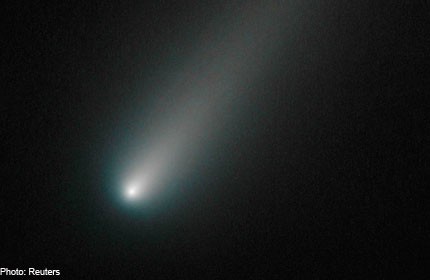All eyes on possible comet landing today


PARIS - European scientists are gearing for the culmination of two decades' work and a €1.3 billion (S$2.1 billion) bet with the first-ever landing on a comet today.
In an operation fraught with peril, an unmanned science lab called Philae will detach from the European Space Agency (ESA) scout Rosetta and descend to a comet 510 million kilometres from Earth.
If all goes well, the 100kg probe will harpoon itself to the surface of Comet 67P/Churyumov-Gerasimenko.
It will then carry out experiments that, astrophysicists hope, could be a landmark in understanding the Solar System and the origins of life on Earth.
"Rosetta spacecraft in excellent shape," ESA tweeted yesterday. "Target locked!"
In 1993, when the Rosetta mission was approved, the Internet did not exist, Bill Clinton and Boris Yeltsin were in government and the hit movie of the year was Jurassic Park.
Riding piggyback on Rosetta on a 10-year trek across the Solar System, Philae has travelled more than six billion km to make its historic rendezvous - spending 957 days of its journey in hibernation.
Mission controllers at Darmstadt, Germany, face a series of four "go/no-go" assessments before giving the final command to let the little explorer detach from her mothership.
Darmstadt should receive confirmation of the separation at 5:03pm.
For veterans of this marathon mission, it will be like the severing of an umbilical cord.
"It's going to be a rather magical moment," said Sylvain Lodiot, ESA flight manager.
Over the following seven hours, the probe will ever-so-gently descend over 20km to the surface of the 4km-long comet.
It will aim for a landing site called Agilkia, an egg-shaped spot measuring just 900m long by 600m wide. It is deemed to be the least hazardous place on a comet studded with rocks and gashed by ravines and cliffs as high as houses - a nightmare for a fragile lander.
Philae will land at 3.5kph, firing two harpoons into a surface the engineers fervently hope will provide grip. Ice screws at the end of its three gangly feet will then be driven into the comet, to prevent the labs drifting off into space from an object with negligible gravity.
The size and heft of a refrigerator back on Earth, Philae will weigh just one gramme - or less than a feather - on "67P".
Rosetta has already sent home fascinating data on the comet, but Philae will provide the first on-the-ground assessment, using 10 instruments to study the comet's physical and chemical composition.
A showstopper find would be molecules known as left-handed amino acids, "the 'bricks' with which all proteins on Earth are built," says ESA.